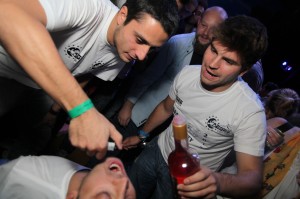Why should we accept “fun” not as a collateral damage, but as a legitimate method of European integration, and how this could even improve AEGEE’s external image?
“Sex, Drugs, and European Nights – and, uhhm, what else is AEGEE about? Oh yeah, we do exchange. And projects. And mutual understanding stuff, and actually even peace-building, they say! We have an office in Brussels and a Comité Directeur working there, telling European politicians to pay more attention to young people. Now that I think of it, I feel kind of proud that I am also part of that. But here at home, in my antenna, I am working hard to organise my events where I will have a good time with European students, and European students with me. And I love AEGEE because it gives me the opportunity to do exactly that!”
Does this sound familiar to you?
This is the rough transcript of a conversation I had with one AEGEE member during my trip to South-eastern Europe this summer. And in fact, I have heard this story many times in the past few years, or even better: I have seen this story unfold before my eyes, time after time. Many of our members are in AEGEE because here is where they find the positive experience they were looking for. Travel! Have guests and be good to them! Dance! Feel! Love! Europe means a promise to them, a very personal promise of freedom, self-development, friendship, solidarity, understanding, and maybe even love – and AEGEE fulfils it. Unconditionally.
very personal promise of freedom, self-development, friendship, solidarity, understanding, and maybe even love – and AEGEE fulfils it. Unconditionally.
Unconditionally? So what about this annoying demand coming from the “European level” that we should be “serious?” That “fun events” are not appreciated, and that some “content” is mandatory? Of course – if the European Commission thinks that the only thing AEGEE does is called “party,” they may not feel very tempted to give us money in the future. We have a lot of intelligent members with a lot of great ideas, and in order to bring these ideas to the European surface, AEGEE needs to maintain its credibility. We need to show our real value to the external world. But does that mean that we should hide the fact that “organised celebration” is an important factor of our work?
Where does this ambiguity come from?
I believe that the main problem is the following: To the outside, it is not visible whether this or that thing we are doing is actually “serious” or “fun.” On the one hand, AEGEE-Europe is trying to promote everything we do as “serious” because this is the impression that AEGEE-Europe wants the rest of the world to have of us. On the other hand, among our antennae we find different  approaches. In fact most of the “local level” promotes AEGEE as “fun,” simply because they believe that promoting it as “serious” will scare new members away. So the Network prepares Summer Universities that are “fun,” but are promoted elsewhere in AEGEE as “serious,” and vice versa. Similarly, the Network organises events that are “fun,” but sells these events to the Events Committee as “serious,” so that it will appear in the AEGEE-Europe Events Calendar, which according to AEGEE-Europe contains “serious” events. What a mess!
approaches. In fact most of the “local level” promotes AEGEE as “fun,” simply because they believe that promoting it as “serious” will scare new members away. So the Network prepares Summer Universities that are “fun,” but are promoted elsewhere in AEGEE as “serious,” and vice versa. Similarly, the Network organises events that are “fun,” but sells these events to the Events Committee as “serious,” so that it will appear in the AEGEE-Europe Events Calendar, which according to AEGEE-Europe contains “serious” events. What a mess!
The result is that many people are disappointed by AEGEE, year after year: People who wanted to travel and party, but ended up in a group of nerds talking about project management all day, and people who expected to discuss the European elections, but instead found themselves under the kitchen table surrounded by bottles every morning. AEGEE’s offer to the world – meaning to our external partners as well as to our fellow European students and potential future members – is like the Box of Pandora. You can never know what you will get. And this has to change!
What can we do to make this change?
Basically, we need to do two things: 1) classify our events as “serious” or “fun” (or a few steps in between), so that everyone knows what to expect; and 2) make sure that events, and I would like to stress that this includes the Agora in particular, will meet the expectations that are raised by this classification. Because after all, “being serious” is not about forbidding the party, not at all. Credibility means that you simply deliver what you promised. If you promised party and you deliver party, everyone will be happy – as long as you at the same time deliver respectable discussion where you promised respectable discussion.
If you have any suggestions of how we could achieve such a change, please feel free to start the discussion!
Written by Thomas Leszke, AEGEE-Köln
Photos by Léa Charlet, AEGEE-Paris & Dasha Onokhova, AEGEE-Moskva

